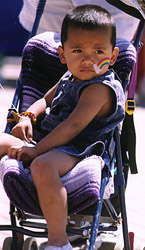Foster Care Frequently Asked Questions

What is foster care?
A child who is not able to live with his or her birth family still needs and deserves a caring and supportive home. In fact, being separated from family is very troubling for a child, so there may be no time in a child's life when living in a good home is more important. The best place for these children to live is with another family, a family that is able to accept the child as one of their own.
 Why become a foster family?
Why become a foster family?
There are many ways to help children and families, but none more direct than opening your heart and your home to a child. Extending a hand to a child who has experienced difficulties, and through him or her to a family, can be both challenging and rewarding.
Every member of a foster family learns and grows through the process of caring for a foster child. Helping a child to heal, then grow and learn can be one of life's most fulfilling experiences.
Who are foster children?
Foster children come from all age groups, from newborn to 17 years of age, and from all backgrounds. What they all have in common is their need for a good home.
A child may need foster care for a number of reasons, including:
- illness, death, or conflict in his or her family;
- neglect or abandonment; and
- physical, sexual or emotional abuse.
Some adolescent children need foster care when their views severely conflict with those of their families.
Foster children may have special needs because of a disability or emotional problem and require more care and attention than their family can provide.
Whatever the reason for needing foster care, each foster child is special and unique. However, most are hurt and confused by the separation from their family. They need encouragement and support to feel good about themselves. They will not forget their own family and will want to stay in touch with them.
How long will foster children stay?
Some children need emergency care for overnight or for a few days. Others need short-term care for a few weeks. Still others need longer-term care that can continue until they are ready to go out on their own.
Every effort is made to reunite a foster child with his or her family or find a permanent home for the child. But while a foster child's stay may be temporary, it should be time well spent with the foster family.
Foster families have to be prepared to give their foster children a lot of time and attention, but still be prepared to help them leave in a positive way, when the time comes. This is difficult to do, and is one of the reasons why fostering requires very special people.
What is the difference between foster care and adoption?
An adopted child becomes the legal child of the adoptive parents.
When a child is fostered, the foster child's parents or a child and family services agency is the legal guardian. Whenever possible, the goal of the agency is to reunite the foster child with his or her family.
 Who can become a foster family?
Who can become a foster family?
Single persons or couples, with or without children, can apply to become foster families. Foster parents may live in an apartment or their own home. They can live in an urban centre or a rural community. Foster parents may be from any ethnic, racial or cultural background.
The qualities important in fostering are that you recognize the value of children and are prepared to offer them care, attention, guidance and patience, in a stable home environment. It is important that the whole family participate in the decision to foster a child. A foster family must be flexible and appreciate that a foster child may not always live up to the their expectations.
It also helps to have a sense of humour!
Do foster families need any qualifications?
Social workers who interview prospective foster families look for some special qualities:
- the warmth to care for a foster child and make him or her feel wanted and loved;
- the tolerance to accept a child from an unstable family background, who may or may not want to be with a foster family;
- the patience to work with a child who may be withdrawn or hyperactive;
- the willingness to accept the fact that the child may still want to be involved with his or her family;
- the commitment to attend training to gain additional knowledge necessary for helping the foster child.
Do foster families receive support?
Foster families receive a daily allowance to cover costs such as food, clothing and spending money for the foster child. Medical, dental and education costs are also covered. The agency provides support and training. There is a foster family manual that provides useful information like the Foster Parents' Rights and Foster Parents' Responsibilities.
Foster families receive direct support through the child and family services agency with which they work. The agency that places a child in your home is required to spend time with you and your foster child. They can help solve problems, plan interventions, arrange family visits and provide respite services.
There are additional programs designed to support foster families, such as:
- The Foster Parent Intentional Damage Compensation Plan; and
- The Foster Parent Legal Aid Assistance Plan.
Details about these plans can be obtained through a child and family services agency.
Is foster care a team effort?
As a foster family, you are part of a team that includes a child and family services worker, others involved with the child and often the foster child's family.
It is particularly important that all team members work closely together, so the child can benefit from consistency. Together, the team will be able to identify the problems the child is experiencing and work out the best solutions, making decisions and plans on behalf of the child. Older foster children may also be actively involved in this process.
How do you apply to become a foster family?
If you think you have the special qualities and time to become a foster family or want more information on fostering, contact the Kinship and Foster Family Network of Manitoba or your local child and family services provider. A worker will explain the foster program to you in detail and answer any specific questions you may have.
